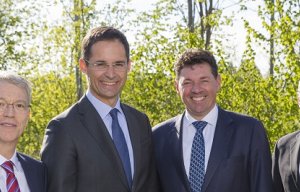
Lenzing achieves best half-year results
The company announces construction of a new air purification and sulphur recovery plant.

9th October 2019
Innovation in Textiles
|
Lenzing
The new plant represents a contribution towards implementing the sustainability strategy. © Lenzing
The Lenzing Group, a leader in the climate-friendly and sustainable production of wood-based textile fibres, has announced its climate targets in August. By 2030, the company aims to reduce its specific CO2 emissions per ton of manufactured pulp and fibres by 50%. By the year 2050, the Lenzing Group will no longer generate any net CO2 emissions.
Lenzing‘s Management Board has now resolved to invest EUR 40 million to expand the production of the raw material sulphuric acid at the Lenzing site. This comprises an important milestone on the path towards climate neutrality. In the future, a new air purification and sulphur recovery plant will not only optimise the company’s self-sufficiency for this raw material and enhance process reliability but improve environmental protection within the context of a clear forward-looking strategy, the company reports.
The new plant represents an important contribution towards implementing the sustainability strategy of the Lenzing Group, and also helps to ensure an even higher level of environmental compatibility of all production operations at the Lenzing site.
The application of state-of-the-art technologies will further improve exhaust emission values. Furthermore, the new facility will help further reduce the use of fossil fuels by generating steam which will, in turn, be converted into electricity. In this way, it will also support the energy self-sufficiency of the company’s operations in Lenzing.
As a result, the production plant in Lenzing will reduce its annual CO2 emissions by 15,000 tons. This is an important step towards further advancing the company’s ambitious plans in the coming years and also strengthen Lenzing’s leadership role as a driver of ecologically sustainable industry.
“On the basis of these investments, Lenzing is taking the next step in achieving its climate targets. At the same time, it will also reach a significantly higher level of autonomy with respect to a vital raw material,” said Stefan Doboczky, CEO of Lenzing.

Business intelligence for the fibre, textiles and apparel industries: technologies, innovations, markets, investments, trade policy, sourcing, strategy...
Find out more